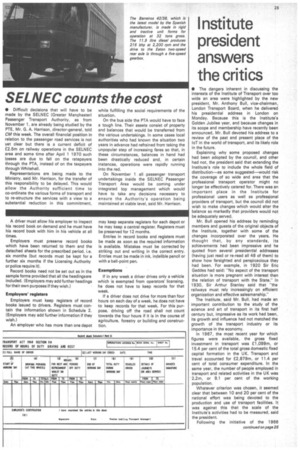SELNEC counts the cost
Page 27

If you've noticed an error in this article please click here to report it so we can fix it.
• Difficult decisions that will have to be made by the SELNEC (Greater Manchester) Passenger Transport Authority, as from November 1, are already being studied by the PTE, Mr, G. A. Harrison, director-general, told CM this week. The overall financial position in relation to the passenger road services is not yet clear but there is a current defict of £2.6m on railway operations in the SELNEC area and some time after April 1 1970 such losses are due to fall on the ratepayers through the PTA, instead of on the taxpayers through Whitehall.
Representations are being made to the Ministry, said Mr. Harrison, for the transfer of this responsibility to be delayed. This would allow the Authority sufficient time to co-ordinate the various forms of transport and to re-structure the services with a view to a substantial reduction in this commitment, while fulfilling the social requirements of the situation.
On the bus side the PTA would have to face a tough line. Their assets consist of property and balances that would be transferred from the various undertakings. in some cases local authorities who had known the situation two years in advance had refrained from taking the unpopular step of increasing fares so that, in these circumstances, balances in hand had been drastically reduced and, in certain instances, operations were rapidly running into the red, On November 1 all passenger transport undertakings inside the SELNEC Passenger Transport Area would be coming under integrated top management which would have to take any decisions necessary to ensure the Authority's operation being maintained at viable level, said Mr. Harrison.
A driver must allow his employer to inspect his record book on demand and he must have his record book with him in his vehicle at all times.
Employers must preserve record books which have been returned to them and the detached sheets for the prescribed period, i.e. six months (but records must be kept for a further six months if the Licensing Authority or police require it).
Record books need not be set out as in the sample forms provided that all the headingsare included. (Employers may add further headings for their own purposes if they wish.) Employers registers Employers must keep registers of record books issued to drivers. Registers must contain the information shown in Schedule 2, (Employers may add further information if they wish.) An employer who has more than one depot may keep separate registers for each depot or he may keep a central register, Registers must be preserved for 12 months.
Entries in record books and registers must be made as soon as the required information is available. Mistakes must be corrected by striking out and writing in the correct entry. Entries must be made in ink, indelible pencil or with a ball-point pen.
Exemptions If in any week a driver drives only a vehicle which is exempted from operators' licensing, he does not have to keep records for that week.
If a driver does not drive for more than four hours on each day of a week, he does not have to keep records for that week. For this purpose, driving off the road shall not count towards the four hours if it is in the course of agriculture, forestry or building and construction.




























































































































